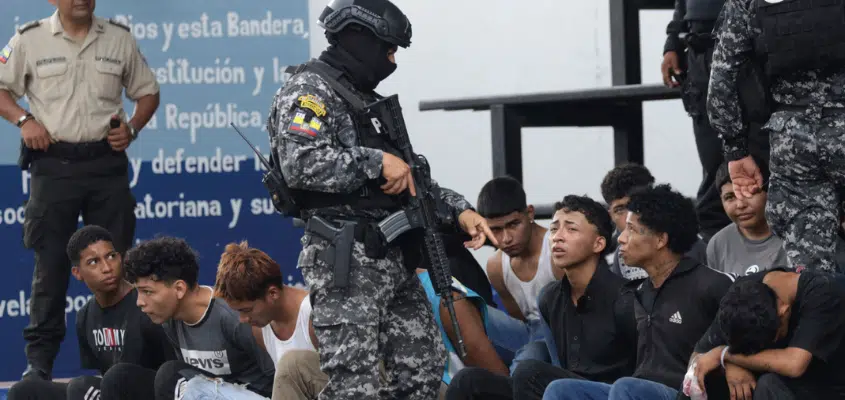by CLAU O’BRIEN MOSCOSO

Ecuador was once a safe country. However, U.S. interference, the rise of neoliberal economic policies, the dollarization of its currency, and enhanced state repression have combined to worsen the lives of the people.
Once on track to be the safest country in Latin America, now Ecuador finds itself mired deep in gang violence, robberies, assassinations and insecurity. Under the last three neoliberal governments of Lenin Moreno, Guillermo Lasso, and current president Daniel Noboa, there has been a surge in violent crime that has derailed any of the gains made during the leftist Correa government. On January 3rd, Black Agenda Report contributor Clau O’Brien Moscoso spoke to economic analyst Juan Fernando Terán to discuss how the surge in violence in Ecuador has political, economic and geostrategic dimensions, with implications for the whole region. This is part 1 of the conversation.
Clau O’Brien Moscoso: Starting specifically with the case of the Guayaquil Four, I wanted to ask, what context can you provide regarding the war on drugs, crime, and the violence happening that has led to tragic cases like this? How does Ecuador go from a success story in the Global South to a 500% increase in homicides?
Juan Fernando Terán: Well, look, I think what is happening in Ecuador needs to be understood within a much broader historical context; otherwise, it’s impossible to truly grasp what is going on. The first thing to point out is that Ecuador has been dollarized since the year 2000, and what initially seemed like a simple economic policy decision, in the long run, has facilitated illegal money laundering in Ecuador.
This marked an impressive internationalization of Ecuador starting in 2000, primarily through financial means, which was not initially evident in other forms. A second long-term factor to consider, which some Ecuadorians foresaw at the time (unlike the first point that caught nearly everyone by surprise), is the implication of this capital transnationalization for money laundering.
What was recognized over 20 years ago, however, is that anything happening in Colombia—where a war has persisted for over 60 years—would inevitably impact Ecuador. That much was clear. In fact, if peace were to be achieved in Colombia, the entire problem of drug trafficking would shift to Ecuador. This outcome was anticipated and predicted.
Therefore, it’s not surprising that from 2000 onwards, the discourse around controlling drug trafficking began to grow stronger. In reality, however, this was more about controlling the Ecuadorian population and serving as a pretext for the United States to establish military bases here.
So, it’s essentially a mechanism for controlling the population. When the U.S. military base was stationed in Manta (a port city in the Manabí province) during the first decade of this century, there was no effective control over drug trafficking. What’s happening now seems to be an attempt to repeat that scenario, but it has little to do with controlling drug trafficking. As Mexican President Claudia Sheinbaum has said: “Why don’t they control drug trafficking in the United States? Are there no mafias in the U.S.? Is money not laundered there? Does the drug trade operate independently in the U.S.? Why don’t they control it there?”
So, this isn’t just about drug control—it’s about population control. The situation involves, first, the transnationalization of illicit capital into Ecuador; second, a U.S. military presence as a preventive measure against the end of Colombia’s conflict (something that was foreseen); and third, the blatant interference of the U.S. embassy in Ecuador at this moment. This isn’t mere speculation.
The United States has always been involved in Ecuadorian politics. For example, one only needs to recall the book written in the 1970s by Philip Agee , where he described how, as a CIA agent, he conducted political operations in Ecuador. They’ve always been here. However, during Rafael Correa’s government, that interference was significantly nullified. They couldn’t exert influence on the government that existed.
Orinoco Tribune for more
